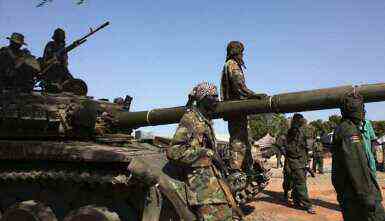Fighting between South Sudanese rivals reaches Bentiu
April 27, 2015 (ADDIS ABABA) – Heavy fighting between the two rival armies in South Sudan has reached Bentiu town, capital of the oil rich Unity state, United Nations Mission in South Sudan (UNMISS) has confirmed.

The rebel governor press secretary, Captain Weirial Puok Baluang, told Sudan Tribune on Monday that forces loyal to president Kiir attacked three positions which were under rebel held areas, about 10 kilometres outside the twin towns of Bentiu and Rubkoni.
“This morning the forces loyal to Kiir have attacked our various frontlines around Bentiu and Rubkotna county, but we have repulsed them back with heavy loss[es],” he told Sudan Tribune on satellite phone outside Bentiu town.
He explained that the opposition forces were intercepting and monitoring unusual movement of pro-government troops since last week in preparation for imminent multi-front attacks on their controlled areas.
Baluang said the government troops were targeting to recapture the oilfields which have been under the control of the opposition forces in south and north of the state capital Bentiu, which resulted to reduction of oil production and near economic collapse in the country.
“The main target for Kiir forces was to advance towards oil fields which were under our control since crisis broke out in mid December [2013],” he said.
He detailed to Sudan Tribune that pro-government forces on Monday attacked Kaljak, west of Rubkotna town, Kuergueyni, in the east and Dhorbor, south of Bentiu town but were all repulsed and pursued the government troops into the heart of the capital
.
He said fighting was still ongoing around the state capital, Benitu, as opposition forces came closer to five kilometres north and south of the town.
Another rebel military deputy spokesman, Dickson Gatluak Jok, in a statement on Monday also warned that the rebel fighters would be forced to retake Bentiu capital, accusing the government of violating the ceasefire and using the town as a launching pad to attack rebel positions.
He accused the government of trying to regain more territories before the beginning of the rainy season in June.
Internally Displaced Persons (IDPs) who have been sheltered in the United Nation camp in Rubkotna county also confirmed that fighting erupted on Monday morning until evening but could not determine which side won the battles.
In another development, government troops have continued to lose Malakal town, another strategic capital of the oil rich Upper Nile state, when forces loyal to a militia group, led by General Johnson Oliny, clashed with pro-government forces and flushed them out of the town last week.
A government reinforcement which attempted to cross from Akoka county towards Malakal were ambushed on the road and repulsed by the rebel group.
UNMISS CONFIRMS FIGHTING
From New York the the Deputy Spokesman for the UN Secretary-General, Farhan Haq, said that the United Nations Mission in South Sudan (UNMISS) confirmed fighting in around Bentiu.
Haq said that the town came under hours of shelling and exchange of fire between the rival forces on Monday. He further accused the government troops of restricting movement of the UN body personnel.
“Government troops prevented a mission patrol from reaching Bentiu this morning and UNMISS flights to the Unity State capital have been suspended,” partly reads UNMISS report.
UNMISS also reported that situation had remained calm in Malakal after government troops were flushed out by the Shilluk militia previously allied to president Kiir’s government, saying the town had been deserted.
The spokesperson said UNMISS extracted ten women and children on Friday, who had been trapped by the fighting along the road between Malakal and the neighbouring county of Baliet and brought them back to the protection-of-civilians site inside Malakal.
The two states of Unity and Upper Nile are the lifeline for the government as they are the only oil producing states in the country on which the government depends by 98% for its revenue.
The two states have become the centre of the conflict as government forces from the various army divisions in the country have been redeployed to greater Upper Nile in order to defend the region from the opposition fighters.
Several ceasefires have been agreed by either sides when the East African regional bloc, the Intergovernmental Authority on Development (IGAD), broke
the first talks in January last year, but none have been observed or either implemented.
Recently the European Union envoy to South Sudan renewed calls to the South Sudanese leaders to respect the terms and conditions of peace talks to bring an end to the bloody conflict in the country.
The last round of peace talks in Addis Ababa which aimed to reach a peace agreement and end the war collapsed on 6 March with IGAD now seeking to expand and resume the mediation under a new mechanism.
(ST)
